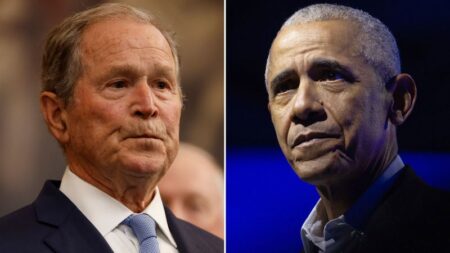Lara Trump, who is the daughter-in-law of former President Donald Trump, is reportedly the frontrunner for a U.S. Senate seat in North Carolina, as indicated by several sources speaking to CNN. This potential candidacy is gaining traction particularly after incumbent Senator Thom Tillis announced he will not seek reelection in the upcoming year, opening the door for a competitive opportunity for Republican candidates in the state.
The departure of Tillis has prompted various Republicans to express their interest in the position. Many potential candidates have already begun reaching out to aides of Donald Trump, presumably in hopes of securing an endorsement from the former president. Such an endorsement would be highly advantageous, potentially ensuring that other Republican challengers would find it difficult to compete in the primaries.
Given her close relationship with Donald Trump, Lara Trump holds a unique advantage. As a former co-chair of the Republican National Committee (RNC) and a prominent figure during the Trump’s campaign efforts last year, she is seen as the leading candidate who also has the implicit support of her father-in-law. Should she choose to forgo her Senate candidacy, Republican allies of Trump suggested they would subsequently evaluate other candidates for the race, especially as parts of the Democratic party see this as a chance to lessen the GOP’s hold in the Senate.
A source familiar with Lara Trump’s current considerations relayed that she has been receiving encouragement from various Republicans to enter the Senate race, indicating that she is actively contemplating the possibility. However, the source also highlighted the personal factors affecting her decision. Lara is a mother, and her desire to spend quality time with her children is weighing on her thoughts as she includes these familial responsibilities in her calculations regarding a possible political campaign.
Lara Trump has strong ties to North Carolina, having grown up there and graduated from North Carolina State University, which may further bolster her appeal to local voters. According to Republican strategist Doug Heye, many discussions are occurring around her potential candidacy, and ultimately, a significant amount of the Republican strategy will depend on the choice she makes.
As other potential candidates begin to emerge, notable figures like Rep. Pat Harrigan and Michael Whatley, the chairman of the North Carolina GOP, have started to express their interest in running. Whatley, who has a solid rapport with the Trump administration, has previously been endorsed by Trump for his leadership role within the party. Additionally, Republican Reps. Richard Hudson and Brad Knott are also eyeing Trump’s blessing to elevate their chances in the race.
Experts in North Carolina’s political landscape, including Heye, registered their acknowledgment that while Lara Trump has the advantages of her connections and media proficiency, she would be entering her first senatorial campaign in a state that Democrats view as a prime target for flipping seats. A pivotal query remains: how effectively can she present herself in public forums and grow her base through in-person campaigning?
Despite these hesitations regarding her inexperience, Raleigh-based consultant Jonathan Felts noted that Lara Trump might surprise many if she launches a campaign. Felts has had prior interactions with her during her consideration for earlier Senate races and believes that she possesses a genuine ability to connect with grassroots support in North Carolina. This connection could potentially position her as a strong contender in the political arena if she articulates a clear vision and platform for her campaign.
In conclusion, the landscape for the North Carolina Senate race is notably shifting as Lara Trump’s candidacy remains a focal point of discussion among party officials and local strategists. Should Lara pass on the opportunity, the Republican party will likely pivot toward other candidates, but her decision will certainly shape the future of the race and could have lasting implications for the upcoming elections.











